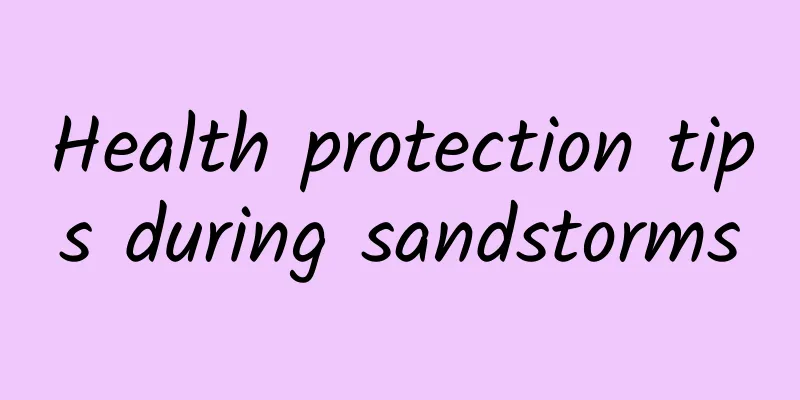Health protection tips during sandstorms

|
Health protection tips during sandstorms In dusty weather, pollutants can directly cause different degrees of irritation or allergic reactions to the human body through the mucous membranes of the eyes, nose, throat and skin. Dust particles can also enter the human body through the respiratory tract, causing a variety of respiratory diseases. The elderly, children, pregnant women, and people with respiratory and cardiovascular diseases are sensitive groups. During dusty weather, sensitive groups should avoid going out as much as possible. If they have chronic cough with sputum or shortness of breath, paroxysmal wheezing and chest pain, they should seek medical attention as soon as possible. People who must be outdoors due to their jobs, such as traffic police, sanitation workers, construction workers, etc., should take personal protective measures. When sandstorms occur, residents should stay indoors as much as possible and take appropriate measures: ①Close doors and windows in time. If necessary, seal them with rubber strips to prevent sand and dust from entering the room; ② Use wet dust removal methods such as mopping with a wet mop and wiping with a wet rag to keep the room clean and avoid re-suspension of indoor dust; ③You can use humidifiers, sprinklers and other methods to keep the air humidity appropriate; ④If conditions permit, turn on the air purifier indoors. If you need to go out, you should pay attention to personal protection: ① Wear a mask to reduce the damage of wind and sand to the respiratory tract. In sandstorm weather, there will be floating dust, inhalable particles and fine particles at the same time, so it is advisable to wear N95 or above protective masks. ② Wear windproof glasses to prevent wind and sand from damaging your eyes. If wind and sand enter your eyes, do not rub them with your hands. Rinse with running water or use eye drops as soon as possible. If you still feel uncomfortable, seek medical attention immediately; ③ Wear dust-proof equipment such as hats and scarves, and wrap your head with scarves to prevent wind and sand from damaging your skin, hair, ears, etc.; ④ After coming back from outside, you should wash your hands and face immediately, rinse your mouth with clean water, clean your nasal cavity, take a bath if conditions permit, and change clothes in time to keep your body clean and comfortable. In addition, during sandstorms, the air is dry, which can easily lead to chapped lips, dry and itchy nose and throat. You should drink more water and eat more fruits and vegetables rich in vitamins to keep your respiratory tract open and moistened, and relieve discomfort in the throat. Some of the above pictures are from the Internet. If there is any infringement, please contact us and we will delete them in time. |
>>: Why does eating pineapple make your mouth prick? It turns out it really has needles!
Recommend
Working ants are more focused after drinking coffee! But this is just the first step to killing ants | Nature Trumpet
Welcome to the 59th issue of the Nature Trumpet c...
How to choose bidding software for bidding promotion?
When we do bidding promotion, we will come into c...
With a speed of 600 kilometers per hour, how will high-temperature superconducting electric suspension technology change future travel?
If you go from Beijing to Shanghai 1200 kilometer...
"I always thought it was influenza A!" A woman had a fever for 2 weeks and was diagnosed with acute leukemia! These symptoms should not be taken lightly
"I always thought I had influenza A. Fortuna...
How did Qutoutiao achieve more than 10 million daily active users?
Qutoutiao has emerged as a dark horse among infor...
Using the AARRR model, let’s talk about APP operations!
The AARRR funnel model, also known as the Pirate ...
Wu Xiaobo: In the era of We-Media 2.0, what is more important than the number of users and 100,000+?
The development of self-media today, like the cur...
China Automobile Dealers Association: Regional market analysis of new energy passenger vehicles in March 2022
According to the China Passenger Car Association&...
Beware! A family of four was poisoned by eating preserved eggs. What happened? Don’t miss this step before eating...
Expert in this article: Li Lin, PhD in Food Scien...
Nanjing Mobile 4G users were cheated and cried: the phone lost connection after turning on
After the TD-LTE license was officially issued at ...
It's obviously very clean, why is there still a strange smell in the refrigerator?
Review expert: Wang Guoyi, Postdoctoral Fellow in...
10 steps for event operation!
This time, we have combined some examples in the ...
3 steps to improve the conversion of information flow, learn them!
Why is my ad not getting any exposure no matter h...
WeChat "Mini Programs" are going to kill apps? Entrepreneurs may not think so
"What is a mini program? A mini program is a...
What is the normal weight for a new Douyin account? What is the weight of the Douyin account I just applied for?
When posting videos on Tik Tok, the positioning a...









